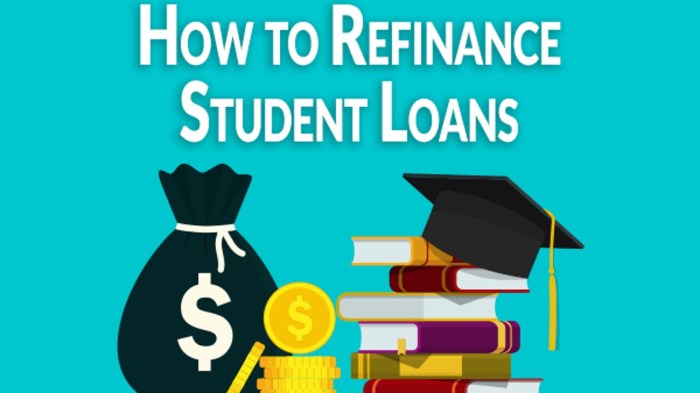
Navigating the complex world of student loan refinancing can feel overwhelming. With numerous companies offering varying interest rates, fees, and repayment options, finding the best fit for your individual financial situation requires careful consideration. This guide provides a comprehensive overview of the process, helping you make informed decisions and potentially save thousands of dollars on your student loan debt.
We’ll explore key factors to consider when choosing a refinancing company, including interest rates, fees, loan terms, and the importance of your credit score. We’ll also delve into the application process, customer service considerations, and provide detailed examples to illustrate the potential benefits of refinancing. Ultimately, our goal is to empower you with the knowledge you need to confidently navigate this crucial financial decision.
Introduction to Student Loan Refinancing

Student loan refinancing is the process of replacing your existing student loans with a new loan from a different lender, typically at a lower interest rate. This can significantly reduce your monthly payments and the total amount you pay over the life of the loan. It’s a strategic financial maneuver that many borrowers utilize to improve their financial situation after graduation.
Refinancing your student loans offers several key advantages. The most obvious benefit is the potential for lower interest rates. A lower interest rate translates directly into lower monthly payments and a reduced total interest paid over the loan’s term. This can free up significant cash flow, allowing borrowers to pursue other financial goals such as saving for a down payment on a house, investing, or paying off other high-interest debts. Additionally, refinancing can simplify loan management by consolidating multiple loans into a single, easier-to-manage payment. Some refinancing options also allow borrowers to switch from variable interest rates to fixed rates, providing greater predictability and financial stability.
However, refinancing student loans isn’t always the best option for everyone. Potential drawbacks include the loss of federal student loan benefits, such as income-driven repayment plans and loan forgiveness programs. These programs can be crucial for borrowers facing financial hardship. Furthermore, refinancing requires a credit check, and borrowers with poor credit may not qualify for the most favorable interest rates or may be denied altogether. Finally, the terms of the refinanced loan, including the interest rate and repayment period, may not be as advantageous as initially anticipated if market conditions change after refinancing. A thorough comparison of current and potential loan terms is essential before making a decision.
Benefits of Student Loan Refinancing
Lower interest rates are the primary draw of refinancing. For example, a borrower with $50,000 in federal loans at 6% interest could potentially refinance to a 4% interest rate, significantly reducing their monthly payment and total interest paid over the life of the loan. This translates to thousands of dollars in savings. Consolidation simplifies repayment by combining multiple loans into one, making budgeting and payment tracking easier. Imagine managing five different loans with varying due dates versus a single, streamlined payment. The ease of management alone can be a significant benefit for many borrowers. Finally, a switch to a fixed interest rate from a variable rate provides financial predictability, protecting borrowers from fluctuating interest rates and potentially higher payments in the future.
Drawbacks of Student Loan Refinancing
Loss of federal student loan benefits is a significant consideration. Income-driven repayment plans, which base monthly payments on income, and potential loan forgiveness programs, which can eliminate a portion or all of the loan balance after a certain period, are often lost when refinancing with a private lender. This is a crucial factor to weigh carefully against the potential benefits of a lower interest rate. Credit score requirements can prevent some borrowers from refinancing at all or from securing favorable terms. A low credit score might result in a higher interest rate than anticipated or even a rejection of the application. Finally, changes in market conditions after refinancing could lead to less favorable terms than those initially agreed upon. For example, if interest rates rise after refinancing, the borrower might find themselves wishing they hadn’t refinanced.
Conclusion

Successfully refinancing your student loans can significantly reduce your monthly payments and accelerate your path to financial freedom. By carefully comparing offers from reputable companies, understanding the associated fees and terms, and considering your individual financial circumstances, you can secure a refinancing plan that aligns with your long-term goals. Remember to thoroughly research each company, review customer feedback, and don’t hesitate to seek professional financial advice if needed. Making an informed decision is key to achieving significant savings and minimizing financial risk.
Essential FAQs
What is the minimum credit score required for student loan refinancing?
Credit score requirements vary among lenders, but generally, a good credit score (typically 670 or higher) is needed to qualify for the best rates. Lenders may consider applicants with lower scores, but they’ll likely face higher interest rates.
Can I refinance federal student loans?
Yes, but be aware that refinancing federal student loans means losing access to federal loan benefits like income-driven repayment plans and potential forgiveness programs. Carefully weigh the pros and cons before refinancing federal loans.
How long does the student loan refinancing process take?
The process typically takes several weeks, from application submission to loan disbursement. The exact timeframe depends on the lender and the completeness of your application.
What documents do I need to apply for student loan refinancing?
Lenders usually require proof of income, employment history, and details of your existing student loans. Specific documentation requirements vary, so check with the lender directly.
